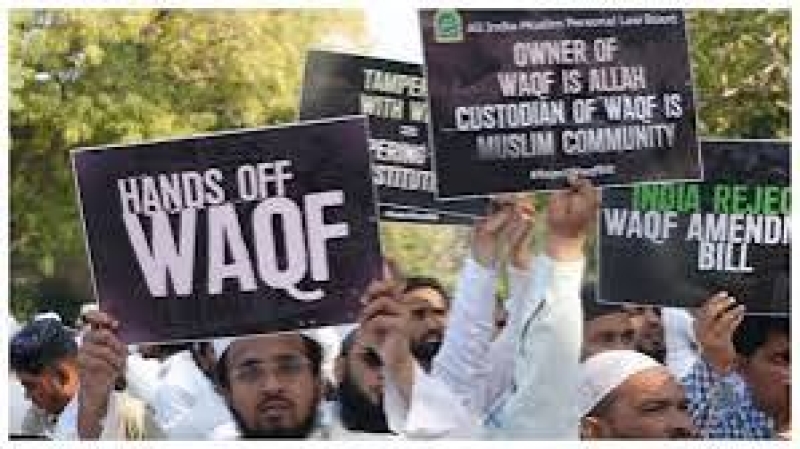- BNP stance on reforms: Vested quarter spreads misinfo; Fakhrul |
- New Secy-Gen Shirley Botchwey pledges to advance Co’wealth values in divided world |
- C. A. Dr. Yunus’ China Tour Cements Dhaka-Beijing Relations |
- Myanmar quake: Imam's grief for 170 killed as they prayed in Sagaing |
- Eid Tourism outside Dhaka turning increasingly monotonous |
India’s Parliament to Debate Controversial Waqf Endowment Law

India's parliament began discussions on Wednesday about a contentious proposal introduced by Prime Minister Narendra Modi’s Hindu nationalist government to amend the laws governing Muslim land endowments, known as waqfs.
The proposed bill would introduce non-Muslim members to the boards that manage waqf properties and expand the government’s role in validating their land holdings. The government argues the reforms are necessary to combat corruption and mismanagement while promoting greater diversity, but critics warn it could further undermine the rights of India’s Muslim minority and potentially be used to seize historic mosques and other properties.
Introduced by Minority Affairs Minister Kiren Rijiju, the Waqf Amendment Bill seeks to reform the Waqf Act of 1995, which established state-level boards to manage waqf properties. The bill’s introduction is expected to spark heated debate in the Lower House, as the Congress-led opposition staunchly opposes the changes. Although Modi’s Bharatiya Janata Party (BJP) does not hold a majority, it may rely on allies to pass the bill. Both the BJP and Congress have instructed their lawmakers to attend the parliamentary sessions.
If approved, the bill must also clear the Upper House before being sent to President Droupadi Murmu for final assent.
Opposition leaders, alongside several Muslim groups, argue that the proposal is politically motivated and discriminatory, aimed at diminishing the rights of minorities. The bill was first introduced last year but was referred to a parliamentary committee for further review after opposition parties raised concerns. The committee’s report, submitted in February, has been met with protests, as opposition leaders claim their input was ignored. The government, however, contends that opposition parties are spreading misinformation to discredit the bill and hinder transparency in managing waqf properties.
What is a Waqf?
A waqf is a type of Islamic charitable foundation where a donor dedicates property—often real estate—for religious or charitable purposes. In India, waqfs control over 872,000 properties across 405,000 hectares of land, valued at an estimated $14.22 billion. Many of these properties date back centuries and include mosques, seminaries, graveyards, and orphanages.
Changes to Waqf Governance
Currently, waqf boards are exclusively staffed by Muslims. The proposed law would mandate the inclusion of non-Muslims on these boards, alongside other changes to the governance structure. One of the most controversial amendments is the potential shift in the ownership rules for waqf properties, particularly historical mosques and shrines. Many of these properties were donated without formal documentation and may be affected by the proposed changes.
The bill would also require waqf boards to seek approval from district officers to validate waqf claims to property, raising concerns that this could lead to Muslim communities losing control over their land. Critics argue this move could enable the government to seize waqf-controlled properties, especially historical mosques and shrines, which Hindu radical groups have targeted, claiming some are built on the ruins of ancient Hindu temples. Several such cases are currently pending in the courts.
Fears of Increased Government Control
While many Muslims acknowledge the need for reform to address corruption and encroachments in waqf management, they fear that the new law could grant the Hindu nationalist government unprecedented control over Muslim properties. This concern has grown amid an increase in violence and discrimination against Muslims under Modi’s leadership, with the community facing growing hostility over issues such as food choices, clothing, and interfaith marriages.
The U.S. Commission on International Religious Freedom’s 2024 report highlighted worsening religious freedom conditions in India, citing the Modi government’s rhetoric against Muslims and other religious minorities during the 2023 election campaign.
Modi’s government, however, maintains that India is governed by democratic principles, ensuring equality and non-discrimination for all citizens.
Muslims, who make up 14% of India’s 1.4 billion population, are the country’s largest minority group. Despite this, they are also among the poorest, as revealed by a 2013 government survey.

